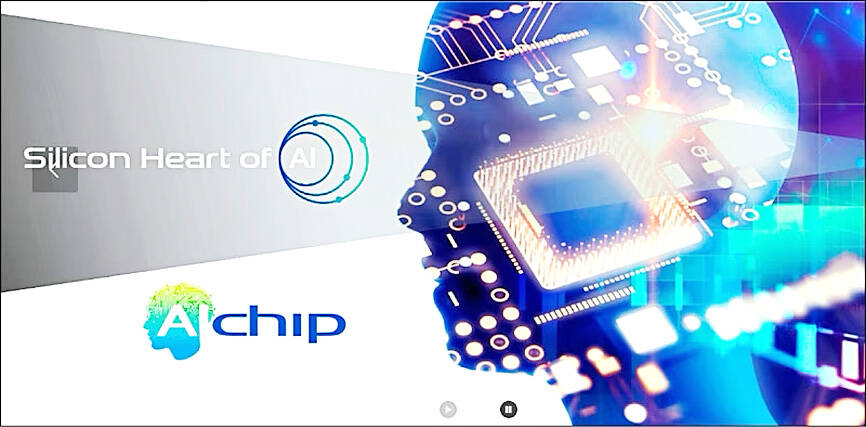Artificial intelligence (AI) chip designer Alchip Technologies Ltd (世芯) yesterday said that revenue and net profit this quarter would surpass a record-high performance in the second quarter, thanks to increasingly stable supply of advanced chip-on-wafer-on-substrate (CoWoS) packaging capacity and new orders.
The Taipei-based company gave a bullish view about next year’s revenue growth momentum, benefiting from a growing trend that cloud service providers intend to make their own AI chips to provide differentiated services.
The company said its confidence is built on strong demand as multiple North-America-based customers are to see their new AI chips entering volume production from next year, chief executive officer Johnny Shen (沈翔霖) told investors yesterday.

Photo: screen grab from the Alchip Technologies Ltd Web site
One of the customers is set to ship AI training chips made on 7-nanometer and 5-nanometer process technologies from this quarter through next year, Shen said.
“Customers’ demand for high-performance-computing [HPC] and AI applications remains robust,” Shen said. “Demand at our largest customer is increasing. Its business forecast for next year significantly surpasses this year’s figures.”
Alchip also saw orders from other customers “drastically increase,” Shen said.
“We anticipate substantial revenue growth for the next three to four quarters,” he said.
Alchip counts Amazon.com Inc and Intel Corp among its AI chip customers. Chips used in HPC, notably servers, accounted for 85 percent of the company’s revenue last quarter, up from 81 percent in the second quarter.
The firm is also making “steady progress” in boosting CoWoS packaging capacity allocations at Taiwan Semiconductor Manufacturing Co (台積電), Shen said.
“We expect smoother production of CoWoS-related products starting in the second half of this quarter,” Shen said.
Supply of CoWoS capacity is a deciding factor in the company’s revenue momentum, Alchip chief financial officer Daniel Wang (王德善) told investors.
Supply constraints of CoWoS packaging capacity was blamed for a sequential decline of 7 percent of revenue in the third quarter.
To cope with the better-than-expected demand, Alchip plans to raise US$350 million by issuing global depositary receipts (GDRs) to finance the expansion of its production lines.
The company plans to issue as many as 40 million new shares in the form of GDRs, about 5 percent of the company’s total share capital.
Addressing investors’ concern about the impact of the US’ curbs on chip exports to China, Shen said the impact would be very minimal, as the affected chips only make up a 1 or 2 percent of the company’s total revenue.
This year revenue from China would drop to less than 15 percent of total revenue, Shen said.
Alchip yesterday reported a net profit of NT$28.09 billion (US$868 million) for the third quarter, a 93 percent year-on-year increase, thanks to robust demand for chips used in servers.
On a quarterly basis, net profit expanded 17.4 percent.
Gross margin improved to 23.75 percent last quarter from 21.34 percent in the second quarter, but fell from 31.7 percent in the third quarter last year.

SELL-OFF: Investors expect tariff-driven volatility as the local boarse reopens today, while analysts say government support and solid fundamentals would steady sentiment Local investors are bracing for a sharp market downturn today as the nation’s financial markets resume trading following a two-day closure for national holidays before the weekend, with sentiment rattled by US President Donald Trump’s sweeping tariff announcement. Trump’s unveiling of new “reciprocal tariffs” on Wednesday triggered a sell-off in global markets, with the FTSE Taiwan Index Futures — a benchmark for Taiwanese equities traded in Singapore — tumbling 9.2 percent over the past two sessions. Meanwhile, the American depositary receipts (ADRs) of Taiwan Semiconductor Manufacturing Co (TSMC, 台積電), the most heavily weighted stock on the TAIEX, plunged 13.8 percent in

A wave of stop-loss selling and panic selling hit Taiwan's stock market at its opening today, with the weighted index plunging 2,086 points — a drop of more than 9.7 percent — marking the largest intraday point and percentage loss on record. The index bottomed out at 19,212.02, while futures were locked limit-down, with more than 1,000 stocks hitting their daily drop limit. Three heavyweight stocks — Taiwan Semiconductor Manufacturing Co (TSMC, 台積電), Hon Hai Precision Industry Co (Foxconn, 鴻海精密) and MediaTek (聯發科) — hit their limit-down prices as soon as the market opened, falling to NT$848 (US$25.54), NT$138.5 and NT$1,295 respectively. TSMC's

TARIFFS: The global ‘panic atmosphere remains strong,’ and foreign investors have continued to sell their holdings since the start of the year, the Ministry of Finance said The government yesterday authorized the activation of its NT$500 billion (US$15.15 billion) National Stabilization Fund (NSF) to prop up the local stock market after two days of sharp falls in reaction to US President Donald Trump’s new import tariffs. The Ministry of Finance said in a statement after the market close that the steering committee of the fund had been given the go-ahead to intervene in the market to bolster Taiwanese shares in a time of crisis. The fund has been authorized to use its assets “to carry out market stabilization tasks as appropriate to maintain the stability of Taiwan’s

In a small town in Paraguay, a showdown is brewing between traditional producers of yerba mate, a bitter herbal tea popular across South America, and miners of a shinier treasure: gold. A rush for the precious metal is pitting mate growers and indigenous groups against the expanding operations of small-scale miners who, until recently, were their neighbors, not nemeses. “They [the miners] have destroyed everything... The canals, springs, swamps,” said Vidal Britez, president of the Yerba Mate Producers’ Association of the town of Paso Yobai, about 210km east of capital Asuncion. “You can see the pollution from the dead fish.